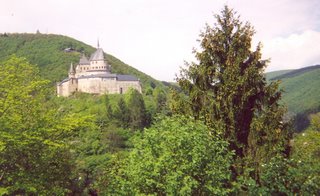Out of the constant battling of the 14th Century as the Ottomans advanced, retreated, advanced again, emerges a triangle: Consider the pitting (think bear pit?) of two religious fervors against each other: Two angles -- Christian Sigismund of Luxembourg, fostering the Wallachians
Dragonists, on crusade; and Muslims, Ottomans under Murad and Mehmet. The third angle of the
triangle is the 'secular humanist' Janos Hunyadi, see that
characterization at https://www.britannica.com/biography/Janos-Hunyadi#ref1231916
This timeline spans several cultures, so will be repeated essentially at https://romaniaroadwaysvladtepes.blogspot.com/
I have tried to follow the genealogies of Wiki and Britannica and get lost in the II's and III's and brothers and half brothers. I choose instead to to follow two other sites mainly when matters confuse: http://www.donlinke.com/drakula/vlad.htm
and http://www.kishiniov.eu/en/childhood-youth-vlad-impaler-dracula/,
I have tried to follow the genealogies of Wiki and Britannica and get lost in the II's and III's and brothers and half brothers. I choose instead to to follow two other sites mainly when matters confuse: http://www.donlinke.com/drakula/vlad.htm
and http://www.kishiniov.eu/en/childhood-youth-vlad-impaler-dracula/,
There are three Vlads. Vlad I, whose existence derives from his son becoming Vlad II, see http://www.donlinke.com/drakula/vlad.htm. See also See https://en.wikipedia.org/wiki/Vlad_II_Dracul
This son Vlad II Dracul son of Vlad I joined the Society of Dragonists in Luxembourg in about 1431, of Wallachia. He had three sons Mircea, the eldest; then Vlad III Dracul who became the Impaler or Tepes, and a younger son, Radu. See http://www.donlinke.com/drakula/vlad.htm.
More detail on their lives: see https://www.romaniaroadwaysvladtepes.blotspot.com.
Although most timelines begin with Luxembourg in 1914, look into history for origins: founded in 963. A portion of Luxembourg known as Belgium became part of the Netherlands. See http://www.worldatlas.com/webimage/countrys/europe/luxembourg/lutimeln.htm
This son Vlad II Dracul son of Vlad I joined the Society of Dragonists in Luxembourg in about 1431, of Wallachia. He had three sons Mircea, the eldest; then Vlad III Dracul who became the Impaler or Tepes, and a younger son, Radu. See http://www.donlinke.com/drakula/vlad.htm.
More detail on their lives: see https://www.romaniaroadwaysvladtepes.blotspot.com.
Although most timelines begin with Luxembourg in 1914, look into history for origins: founded in 963. A portion of Luxembourg known as Belgium became part of the Netherlands. See http://www.worldatlas.com/webimage/countrys/europe/luxembourg/lutimeln.htm
1346-1378 -- Charles IV of Luxembourg, elected emperor of the Holy Roman Emperor and then King of Bohemia. This was an area of importance.
1378-1400 -- Wenceslas, King of the Romans, ruled the House of Luxembourg, see https://en.wikipedia.org/wiki/List_of_state_leaders_in_1387#Europe
 Vianden Castle, mountain view, Luxembourg
Vianden Castle, mountain view, Luxembourg
1378-1400 -- Wenceslas, King of the Romans, ruled the House of Luxembourg, see https://en.wikipedia.org/wiki/List_of_state_leaders_in_1387#Europe
 Vianden Castle, mountain view, Luxembourg
Vianden Castle, mountain view, Luxembourg1408 -- Sigismund, 1387-1437 , King of Hungary and then Holy Roman Emperor, then became Sigismund of Luxembourg.
1410 --- Sigismund of Luxembourg founded an Order similar to the Crusading orders, the Order of the Dragon, the Society of the Dragonists, here see https://en.wikipedia.org/wiki/Order_of_the_Dragon.
See http://www.donlinke.com/drakula/vlad.htm
1436-1422; Vlad II rules Wallachia with approval of Sigismund.
1437 -- Sigismund died
1438 -- Murad II invades Wallachia
Hereafter: Not of specific Luxembourg concern, except for concept that this small European area as a whole, see map, had such an early interest on Ottoman progress and need for defense, carrying over to Serbia, Czech, Hussite war veterans, and others moving to the east to fight. Do we forget how mobile this era was. Continuation: See https://www.romaniaroadwaysvladtepes.blogspot.com
Best history of the region, in short: See http://www.donlinke.com/drakula/vlad.htm
Best history of the region, in short: See http://www.donlinke.com/drakula/vlad.htm
1441 -- John Hunyadi, voivode (prince)) of Transylvania convinces Vlad to join in an effort against the Ottomans, defeats an Ottoman army in Transylvania, then Murad convinces Vlad to come to Edirne (east Thrace, near borders of Greece and Bulgaria, Turkish. Hone in at map.
Janos Hunyadi: See castle at Hunedoara, Romania, in excellent condition, a factory next door, packed area of industrialization, which perhaps prevented its destruction. See https://romaniaroadwaysvladtepes.blogspot.com/2006/08/hunedoara-johan-hunyadi-vlad.html
Hunyadi: a 'contemporary humanist' see https://www.britannica.com/biography/Janos-Hunyadi#ref1231916
1442 -- Vlad is captured in Edirne by Murad. Hunyadi invades Wallachia. Made the cousin of Vlad, Basarab II, voivode. Hunyadi begins a 1442-1443 engagement against Ottomans (the "Long Campaign"), with help of Venice and the Papacy, see https://www.britannica.com/biography/Janos-Hunyadi#ref1231916).
- Inter-group involvements. Janos Hunyadi: among the first rulers to maintain a standing army rather than rely on feudal levies. Hired Czechs, Serbs, veterans. See site. Crossed the Danube, into Serbia (Sofia is now Bulgaria) to fortified Turkish garrisons. Got to the Balkans, were forced back by winter weather, and regrouped in Buda, Montenegro.
1453 -- Fall of Constantinople to the Ottomans under Mehmed II. In Europe, the Order declines, but remained vital to Romania, Serbia, Croatia and Hungary still confronting Ottomans.
1463 -- Vlad Dracul takes Wallachia with help of Hungarians.
1477 -- Luxembourg and some 16-17 other provinces (mostly the 'low countries') became property of the Habsburgs, Austria.
1638 - France joined the 30 years war, Luxembourg big battleground. French prevailed; then to Spain.1697, then back to France
1840 -- Willem II of the Netherlands became Grand Duke of Luxembourg
1867 -- Luxembourg independent, etc. see site.
No comments:
Post a Comment